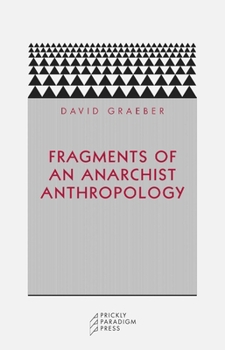Fragments of an Anarchist Anthropology
Everywhere anarchism is on the upswing as a political philosophy--everywhere, that is, except the academy. Anarchists repeatedly appeal to anthropologists for ideas about how society might be... This description may be from another edition of this product.
Format:Paperback
Language:English
ISBN:0972819649
ISBN13:9780972819640
Release Date:April 2004
Publisher:Prickly Paradigm Press
Length:118 Pages
Weight:0.25 lbs.
Dimensions:0.3" x 4.5" x 7.1"
Customer Reviews
4 ratings
Theory, Practice, Intellectual Work: Graeber on Anarchism
Published by Thriftbooks.com User , 17 years ago
David Graeber's highly engaging contribution to social theory doesn't claim to say anything particularly "new" about anarchist social movements. Rather, he seeks to link academic anthropology's body of knowledge (about "actually-existing self-governing communities" in the world today) to the utopian desires of global anarchism. Forging this link, Graeber intuits, would help academic social theory escape the pretension of prescribing radicalism and would instead attune it to already-existing utopian political practices. In this regard, Graeber's work is a modest attempt at transforming how we go about thinking *and* doing revolutionary strategy. The book is really a long essay that stakes out various positions in what Graeber says is a "non-existent science." Weary of academics who flaunt their leftist credentials while leading privileged lifestyles, Graeber uses anarchism to explain how theory and practice might be brought into dynamic consonance: "[Anarchism] is primarily concerned with forms of practice; it insists, before anything else, that one's means must be consonant with one's ends; one cannot create freedom through authoritarian means; in fact, as much as possible, one must oneself, in one's relations with one's friends and allies, embody the society one wishes to create." Basing his view of academic work on anarchist principles, then, Graeber argues that the knowledge one makes must have a real, practical relation to the politics one imagines. This book is a breath of fresh air in the otherwise moribund sphere of academic social theory. By showing vanguardism and radical skepticism to be inimical to the kind of self-governing, direct-action politics that anarchism espouses, Graeber challenges intellectuals to engage real people, real desires, and real processes of decision-making beyond the low-stakes "game" of academic infighting (otherwise known as: my theory is better than yours). Thus, in addition to being a fine primer on anarchist theory-practice (where theory and practice are co-constitutive elements of revolutionary strategy), Graeber's book offers an important perspective on why intellectuals must question their stakes and their interests in "studying" politics at all.
An interesting approach.
Published by Thriftbooks.com User , 19 years ago
I very much enjoyed this book. As something of an anarchist, I find myself thinking about anarchist approaches to world problems, but the problem I see is that anarchism is more of a methodology than an ideology. Essentially, it is a moral and practical approach toward social change. It reaches me than the theoretical approaches to strategizing like Marx's and other armchair revolutionists' work. Essentially, Graeber is searching for methods where we can institute the anarchist's approach to studying society, which sounds like a paradoxical premise at first because anarchism isn't so much a theory as it is a practice, but it makes sense. Basically, his approach aims tp make the study of society much more praxeological in approach, as opposed to creating a set of ideas alienated from real human behavior, by using an anarchist perspective to study society. I really like what he's done here, although there is much less meat than I had hoped for. I'd like to see a bigger book with some examples of what he's looking for (like new approaches to sociology and an entirely new way to look at the concept of the state). I think it will take years to develop a large body of theory to work with, but he's on to something groundbreaking.
Blowing up walls
Published by Thriftbooks.com User , 19 years ago
The book is meant to be examined not as a coherent set of theories or practices for instituting anarchist methods, but is instead, as the title indicates, meant to reveal fragments and pieces of an anarchist approach to society. Previous reviews mention the "dark side of humanity", or "basic human nature", but they would seem to assume much about the inner workings of human beings. It is not altogether absurd to forsee an interest in anarchist practice more broadly as people continue to see what results from the use and abuse of power. Graeber's book is a thought experiment, an attempt to envision an alternative to what we have now, not a manifesto pointing out exactly what should be done. He has excellent critiques of what we currently view as "democracy", and also does a thoughtful job examining Pierre Clastres' work "Society Against the State", as well as offering examples of groups which were much more egalitarian in nature, including those that broke away from states to become so.
Review for "Fragments of an Anarchist Anthropology"
Published by Thriftbooks.com User , 19 years ago
In this book, "Fragments of an Anarchist Anthropology", Graeber presents alternatives to the social systems we have presumed are our only paradigms. He points to successful anarchist organizations (and experiments) worldwide as a potential directions for Western societies to follow. What Graeber doesn't address is the complex role of humanity's "dark side" or the difficulties of integrating a technological society into a harmonious utopian anarchist whole. However, the book is commendable as it defends anarchy as an existing social alternative and charges the reader to consider how it could possibly be implemented.




